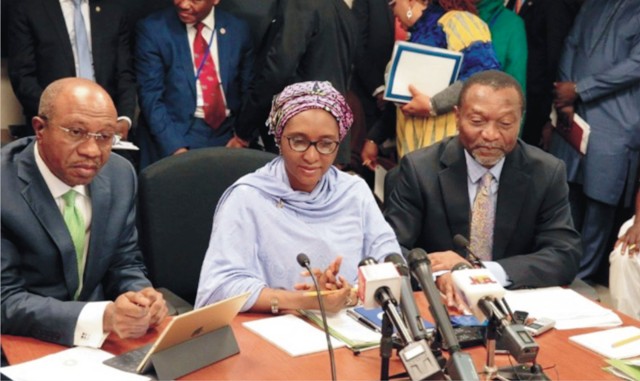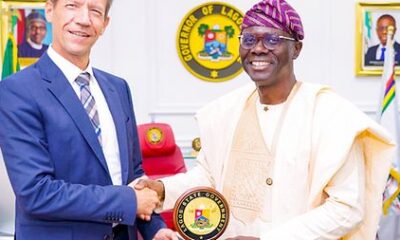Business
Insecurity: World Bank Expresses Concern, Proffers Measures To Curtail Trend

The World Bank Group President, David Malpass, yesterday expressed concern about the increasing spate of insecurity globally.
Malpass said this in his speech at the Warsaw School of Economics in Poland ahead of the 2022 Spring Meetings titled “Addressing Challenges to Growth, Security and Stability’’.
The session was monitored virtually by the News Agency of Nigeria.
He said millions of people were suffering amid massive reversals in development.
According to Malpass, effective allocation of capital, promotion of growth and production and keeping markets open are some actions global community could take to address the situation.
He said that the overlapping global crises were resulting to a weak economic outlook.
According to him, the violence is unfortunately not confined to Ukraine.
“Just over the last year, we have witnessed serious setbacks for development and security, including Afghanistan’s collapse, Lebanon’s crisis, and coups and violence across the Sahel, Ethiopia, Somalia, and Yemen.
“Millions of Syrians are living in refugee camps in Jordan, Lebanon, and Turkey. Inter-ethnic and inter-religious strife plagues Myanmar and other parts of Asia.
“And in Latin America and the Caribbean, levels of crime and violence are alarmingly high, with some urban and rural areas controlled by criminal gangs or drug cartels.
“The trend toward insecurity is deeply concerning. This year, 39 of the 189 member countries of the World Bank Group are experiencing open conflict situations or remain worryingly fragile,’’ Malpass said.
He said that the number of people living in conflict areas nearly doubled between 2007 and 2020.
“Today, in the Middle East and North Africa, one in every five people lives in an area affected by conflict.
“This unraveling of security has brought a surge in the number of refugees, which more than doubled over the last decade to exceed 30 million refugees in 2020,’’ he said.
Malpass however, said that each of the ongoing crises hits the vulnerable the hardest, often women and girls.
He said “on the economic front, trends are not encouraging. Prior to the war in Ukraine, the recovery in 2022 was already losing momentum due to rising inflation and lingering supply bottlenecks.
“While advanced economies were expected to return almost to their pre-pandemic growth rates in 2023, developing economies were lagging substantially behind,’’ he said.
Malpass said that the war in Ukraine and the COVID-19 lockdowns in China were further reducing the recovery path.
According to him, of concern, the repercussions are worsening the inequality as the war affects commodity and financial markets, trade, and migration linkages, and investor and consumer confidence.
“Advanced economies with well-developed social protection systems are cushioning parts of their populations from the damage from inflation and trade blockages, but poorer countries have limited fiscal resources and weaker systems to support those in need.
“Currency depreciations and inflation are hitting the poor hard, causing fast increases in 2022 poverty rates.
“Adding to the burden, developing country debt has risen sharply to a 50-year high—at roughly 250 per cent of government revenues.
“Debt vulnerabilities are particularly acute in low-income countries, where 60 per cent are already experiencing or at high risk of debt distress,’’ he said.
Malpass further said that most emerging markets and developing economies were ill-prepared to face the coming debt shock.
“Exposures to financial sector risk are opaque at this point, but one measure, the cost of insuring against default in emerging markets, has reached its highest point since the onset of the pandemic,’’ he said.
Malpass, however, included steadfast commitment to security and stability as part of measures to address the situation.
According to him, durable peace takes constant effort to strengthen institutions, reduce inequality, raise living standards, and provide defences.
“In the alternative, security crises trigger massive increases in poverty and decimate the middle class,’’ he said.
Business
Over $1.5bn Spent To Protect Nigeria’s Oil Installations -FG

The Federal Government has said it has spent over $1.5 billion from 2020 to date to protect the nation’s oil installations and curb crude oil theft.
The Secretary to the Government of the Federation (SGF), George Akume, made this known, yesterday, at a public hearing of the House of Representatives on crude oil theft.
Akume was represented by the Permanent Secretary, General Services, Maurice Nandi.
The Federal Government was concerned about the report from the Nigerian Extractive Industries Transparency Initiative (NEITI), which pointed to over $46 billion worth of stolen crude between 2009 and 2020.
“The House had set up a special committee, headed by the Chairman of the House Committee on Petroleum Upstream, Ado Doguwa, to investigate the losses in the oil and gas sector,” Akume said.
Additionally, Speaker of the House Tajudeen Abbas, represented by Deputy Speaker Benjamin Kalu, said $10 billion has been lost in seven months to crude oil theft.
Business
FG Unveils Metering Project Teams To Combat Oil Theft

The Nigerian Upstream Petroleum Regulatory Commission (NUPRC) has inaugurated Metering Audit and Advance Cargo Declaration project teams, to promote transparency and accountability in the upstream oil and gas.
The Commission’s Chief Executive, Mr Gbenga Komolafe, who spoke at the inauguration of the project teams, on Wednesday in Abuja, said the projects were designed to combat crude oil theft and boost revenue.
It will be recalled that the Federal Executive Council (FEC) had approved a 21 million dollars contract to audit metering and measurement equipment in the 187 oil flow stations in the country and also put in place an advance cargo declaration solution.
These initiatives as earlier announced by Minister of State for Petroleum Resources Sen. Heineken Lokpobiri, aims at enhancing monitoring and accountability in crude oil production and distribution, addressing rampant oil theft.
Komolafe, while inaugurating the project monitoring teams, announced a four-month deadline for the completion of the projects.
According to him, the initiatives zre in line with NUPRC’s mandate to ensure optimal government revenues from upstream petroleum operations, as specified in the Petroleum Industry Act (PIA) 2021.
He said the projects would be executed by PE Energy Limited and P-Lyne Energy.
“Audit of Upstream Measurement Equipment and Facilities project aims to establish reliable baseline data for all measurement points, identify gaps in production and allocation measurement, and implement targeted interventions to enhance metering infrastructure.
“This project is crucial in addressing issues such as the presence of obsolete equipment, lack of a comprehensive database and absence of real-time production measurement across many locations.
“Advance Cargo Declaration Solution complements the metering audit by establishing a robust system for declaring and tracking crude oil transportation and exports from Nigeria,” he said.
He said the project would monitor and account for the movement of crude oil within the country, prevent disruptions, theft, and under-declaration, and ensure that only certified products were being exported.
“It will also enable real-time tracking, reconciliation, and reporting of crude oil exports to facilitate accurate revenue billing and generation.
“For a long time as a nation we have suffered from the menace of crude oil theft and there have been contentions on the accuracy in terms of our hydrocarbon accounting in Nigeria in a manner that has impacted our federal revenue unfavourably.
“So what has happened is that the commission, within its assumption of office, has been able, as a regulator, to take a very bold measure to address this issue.
“We have 31 crude oil loading terminals. So we are trying to ensure that we put in place a framework where the nation will be able to accurately determine and measure the volume of crude that is loaded from these terminals,” he said.
He tasked the teams, comprising experts from various NUPRC’s departments, to discharge their duties professionally, adding that the projects would be delivered within four months, while any request for timeline extension would not be entertained.
The NURPC boss said that each project had a dedicated team, led by Mr Enorense Amadasu, Executive Commissioner for Development and Production, NURPC, with strict timelines for completion.
While commending President Bola Tinubu for his support, Komolafe urged stakeholders to cooperate with the teams to facilitate successful implementation of the projects.
“Team for Audit of Upstream Measurement Equipment and Facilities in the Nigerian Oil and Gas Industry” project comprise ; Manuel Ibituroko – Deputy Director, Facilities Engineering & Optimisation; Mohammed Sirajo – Manager, Facilities Engineering; Ike Chidi – Manager, Facilities Engineering; and Bashir Shariff – Principal Regulatory Officer.
“Team for Advance Cargo Declaration Solution” project, comprise: Bello Shehu – Assistant Director, Crude Oil & Gas terminal Operations; Abdulrahman Idris – Manager, Petroleum Accounting; Omeje Desmond – Deputy Manager, COTO PHC; Dimkpa I. H. – PRO, COTO Warri and Olatunji Babatunde – NDR”.
He said the teams would liaise with the contractors to ensure the fulfilment of the Commission’s specified obligations and monitoring the implementation of the projects to ensure alignment with the scope and specifications.
Responding, one of the two contractors, Chief Executive Officer, PE Energy Ltd, Daere Akobo, thanked the Federal Government for the confidence repose in them to take a pragmatic look at hydrocarbon accounting.
Also, the Director, P-Lyne Energy, Tomi Ogunwole assured that the company would abide by the four-month deadline set by the commission.
Business
FG Launches Blueprint For Africa’s Digital Trade
The Federal Government of Nigeria has launched a comprehensive strategy to spearhead Africa’s digital trade revolution, aligning with the African Continental Free Trade Agreement (AfCFTA) framework.
The initiative, a key component of President Bola Tinubu’s Renewed Hope Agenda, is aimed at leveraging trade as a driver of economic growth and continental unity in accordance with AfCFTA’s objectives.
According to Vice President Kashim Shettima, in his X handle (formerly twitter), “Nigeria is in a unique position to spearhead the continent’s technological transformation”.
He said the strategy includes implementing AfCFTA’s Digital Trade Protocol, developing technical talent hubs, enhancing digital infrastructure investments, and promoting innovation and entrepreneurship.
Shettima stated this while delivering a keynote address during a stakeholders’ summit with the theme, “Digital Trade in Africa: The Renewed Hope Strategy”, at the Presidential Villa, Abuja.
The Vice President emphasised the need for public-private sector synergy and assured continued government investment in digital infrastructure and human capital development.
On his part, the Minister of Communications, Innovation, and Digital Economy, Bosun Tijjani, highlighted the Tinubu administration’s substantial investments in all aspects of the digital trade protocol, aiming at harnessing opportunities both in Nigeria and across the continent.
He stated that innovative policies and programmes, such as the Three Million Technical Talent programme, the data protection policy, and increased investments in digital infrastructure, were equipping Nigeria’s young population for current and future opportunities.
Tijjani stressed the critical role of technology in facilitating trade across Africa, noting that the unprecedented opportunities within the single market area could be best leveraged through effective collaboration and networking enabled by digital technology.
-
News3 days ago
Police rescue 10 pregnant women in A’Ibom
-
Nation3 days ago
Group Applauds MOSOP Over Stance On Oil Production In Ogoniland
-

 Featured1 day ago
Featured1 day agoNigeria Capable Of Providing Good Healthcare System -German Consul-General
-
Metro1 day ago
Traditional Rulers Mobilise Subjects For Fubara
-
News3 days ago
We’ll Deliver Okania-Ogbogoro Road By Dec, Fubara Assures …Says 90% Drainage Work Ready
-
Health3 days ago
Natural Recipe For Longer Life
-
Sports1 day ago
RMFA Ends Screening In PH …As Parents Express Excitement
-
Politics1 day ago
Edo Poll: PDP Kick-Starts Ward-To-Ward Campaign

